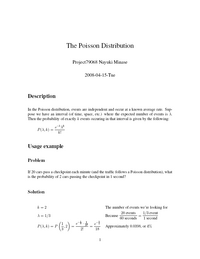Poisson Distribution

A PDF version, typeset with LaTeX, is also available.
Description
In the Poisson distribution, events are independent and occur at a known average rate. Suppose we have an interval (of time, space, etc.) where the expected number of events is λ. Then the probability of exactly k events occuring in that interval is given by the following:
P(λ, k) = e−λ λk / k!
Usage example
Problem
If 20 cars pass a checkpoint each minute (and the traffic follows a Poisson distribution), what is the probability of 2 cars passing the checkpoint in 1 second?
Solution
k = 2 (The number of events we're looking for)
λ = 1/3 (Because 20 events per 60 seconds is equal to 1/3 event per 1 second)
P(λ, k) = P(1/3, 2) = e−1/3 (1/3)2 / 2! = e−1/3 / 18 ≅ 0.0398, or 4.0%
Derivation
Divide the interval in which events occur into n (discrete) slots. At each slot, the probability of an event occuring is λ/n.
By the binomial theorem, the probability of k events occuring in n trials where the success probability of each trial is λ/n is:
(n choose k) (λ/n)k (1 − λ/n)n−k
Because the Poisson distribution deals with events occuring on a continuous interval, let the number of slots be arbitrarily large. In other words, take the limit of that expression as n approaches infinity:
| P(λ, k) = limn→∞ (n choose k) (λ/n)k (1 − λ/n)n−k | |
| = limn→∞ (n choose k) (λ/n)k (1 − λ/n)n (1 − λ/n)−k | Expand |
| = limn→∞ (n choose k) (λ/n)k e−λ (1 − λ/n)−k | By the definition of e |
| = limn→∞ (n choose k) (λ/n)k e−λ | Because (1 − λ/n) approaches 1 |
| = limn→∞ (1/nk) (n choose k) e−λ λk | Expand |
| = limn→∞ (1/nk) (1/k!) (Πm=n−k+1n m) e−λ λk | Express binomial coefficient as a product |
| = limn→∞ (1/k!) (Πm=n−k+1n m/n) e−λ λk | Put into product |
| = limn→∞ e−λ λk / k! | The product approaches 1 |
| = e−λ λk / k! | Limit of a constant |
Total probability
What is the total probability over all outcomes?
| Σk=0∞ (e−λ λk / k!) | Sum over all outcomes |
| e−λ Σk=0∞ (λk / k!) | Extract constant out of summation |
| e−λ eλ | The sum is the power series for eλ, valid for all λ∈ℝ |
| e0 | By laws of exponents |
| 1 | By definition of exponential function |
As expected, the total probability is 1, regardless of the value of the parameter λ.
Links
Last modified: 2008-04-16-Wed
Created: 2007-05-26-Sat